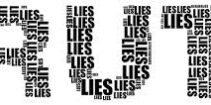I vow not to lie, but to speak the truth.
What does it mean to lie? Technically, everything is a lie, because that’s how language works. Everything we say is a misunderstanding. We can never say exactly what we want to say, and it is always possible to find discrepancies.
So this precept is not about saying something that is inconsistent with the Truth. Rather, it is about intention. What is this intention about? It is about the essence of the bodhisattva vow, which is to help people have clarity. Of course, a bodhisattva vow is more than just not lying. Being enlightened means freeing oneself from the prison of any concepts.
People who are not enlightened still rely on a conceptual understanding of the world. However, some confusions may be more or less useful than the others. Therefore, the deepest aspiration of this precept is to help people gain a proper and healthy understanding of the reality that surrounds them so that they can make choices that benefit them and others.
Lying, then, is more about the intent to confuse someone or to help that person build up an inadequate understanding so that that person will make a decision that will not be good for themselves or for something they care about.
Defining lying in this way can avoid a pedagogical trap, because in this case, lying is not just saying something, but being selective or not sharing something and letting the person do harmful things.
In other words, I understand this precept to be more about avoiding abuse than just looking at whether the sentences we say are formally true.
The areas I am most concerned about are advertising and marketing. We assume that these activities are “normal” operations of any organization and there is nothing suspicious about them. It is also obvious that advertising is not a source of information and is not objective. Their goal is to restructure our minds and reprogram our reactions to benefit the publisher.
We do not have many ways to fight back, and it’s hard to live a normal life avoiding them. The discussion about the ethical consequences of advertising is not public debate because the business model of today’s media is based on advertising. Many “free” services are really selling access to our minds, and we are really the product they are offering. This was one of the reasons I left my job at a TV oriented company. I felt like I was supporting something unethical. It was also difficult to have a discussion with my colleagues. In a way, we were all corrupted because we all benefited from it.
On the other hand, sometimes a lie can be the most generous thing we can do. The story from the Lotus Sutra about the father who draws the children out of the fire by lying to them about an extraordinary card is a great example. It also shows that caring or abuse are much better criteria than just conforming to the truth. But it is also a technique of last resort. It should only be used when someone is unable to gain a more appropriate perspective and the current understanding is leading to great suffering.
Dharma teachers also have no choice. They must simplify their explanations so that they can be understood and assimilated. It is only a temporary lie, but its purpose is to enable someone to better understand the whole picture later.
We lie very often even in casual situations, for example, we may say, “Have a nice day” to someone we do not like. This may not be true at the moment, but we want to make it our intention. By saying this, we are trying to reprogram ourselves and hope that the person will respond positively, which will help change the patterns of interaction between us.
We may also say something that is not true, not because we want to mislead someone, but because we ourselves are confused. We should definitely pay attention to the limits of our own understanding, but this is an area where very often there is not much we can do. We can only avoid being negligent and spreading unverified facts.







